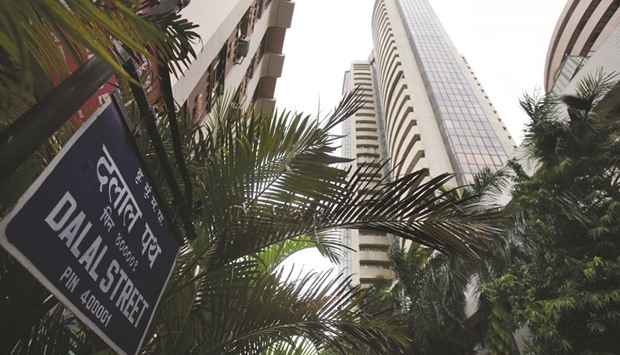India’s benchmark stock index dropped from an 11-month high after the nation’s largest telecom companies cut tariffs and quarterly earnings from the biggest consumer company disappointed investors.
Mobile-phone operators Bharti Airtel and Idea Cellular were among the worst performers on the MSCI Asia Pacific Excluding Japan index after lowering data prices before billionaire Mukesh Ambani’s Reliance Jio Infocomm launches its services. Reliance Industries, which operates the world’s biggest refinery complex, erased gains of as much as 2.7%. Hindustan Unilever (HUL) tumbled the most in five weeks after reporting profit and revenue that lagged behind estimates.
The S&P BSE Sensex dropped 0.32%, or 89.84 points, at 27,746.66 at the close, erasing an intraday advance of 0.6%. Investor attention has turned to the June quarter results season for signs that stock valuations near a five-year high are supported by company earnings.
The broader Nifty index closed 0.38%, or 32.70 points, lower at 8,508.70.
“India is not a cheap market so any disappointment in corporate earnings recovery or a delay in the government implementing key reforms could add to volatility,” Kristy Fong, a Singapore-based assistant investment manager at Aberdeen Asset Management, said by e-mail. “There’s high expectation for corporate earnings growth. We have to see that come through for current levels to be supported.”
Prime Minister Narendra Modi is banking on the passage of the Goods and Services Tax (GST) bill in current session of Parliament that began yesterday to bolster economic growth. The proposal, the nation’s biggest tax reform in decades, has been blocked by the Congress party in the upper house where it is in majority for more than a year. Congress leader P Chidambaram said the party is waiting for the government to include its suggested changes to the proposed bill.
The Sensex entered a bull market last week, helped by forecasts for above-normal rain after back-to-back droughts and a recovery in company earnings.
The advance sent the gauge’s 14-day relative strength index to 72 on Thursday, above the 70 level that some investors see as a signal to sell. Valuation rose to 16.4 times projected 12-month profits, 15% higher than its five-year average, data compiled by Bloomberg show.
Still, overseas funds bought $211mn of shares on July 15, the sixth straight day of net purchases. They’ve invested $3.6bn in Indian stocks so far this year, the most after Taiwan and South Korea, data compiled by Bloomberg show.
“We continue to like the India story, which presents tremendous growth opportunities in the long term,” Aberdeen’s Fong said. Bharti Airtel tumbled 4.3%, the most since April 5, and Idea Cellular slumped 6.5%, the steepest drop since June 3.
Airtel will offer prepaid customers as much as 67% more data at the same cost, the India’s largest mobile company said on Sunday. Idea Cellular, the third-biggest carrier controlled bybnaire Kumar Mangalam Birla’s Aditya Birla group, is offering as much as 45% more data, the mobile company said July 15.
Reliance Jio, whose strategy is to offer high-speed data cheaply to lure users, faces a rate fight even before starting operations as it missed multiple deadlines, giving rivals time to improve their networks and come up with revised plans.
HUL decreased 2.1%, the most since June 9. The company reported first-quarter profit of Rs1,170 crore, which missed the Rs1,150 crore estimated by analysts. Sales of Rs8,130 crore were less than the Rs8,520 crore forecast in a Bloomberg survey. RIL dropped 0.6%. The stock had climbed in early trading after the company posted a 19% jump in first-quarter profit after markets hours on Friday.
Meanwhile the rupee weakened against the US dollar, while the 10-year bond yield gained, yesterday after the Reserve Bank of India (RBI) governor Raghuram Rajan ruled out a rate cut in the next policy meeting.
The home currency closed at 67.20, down 0.18% from its previous close of 67.07. The local currency opened at 67.14 a dollar and touched a low of 67.21.
India’s 10-year bond yield closed at 7.295%, compared with Friday’s close of 7.272%. In an interaction with select journalists on Sunday, Rajan all but ruled out an interest rate cut in August, when the central bank reviews its monetary policy, citing escalating inflation pressures. Next RBI policy meeting is on August 9.
India’s rupee is reasonably valued and a devaluation of the currency will spur inflation and not necessarily help exports, Rajan said in Hyderabad.
India’s merchandise exports expanded for the first time in 19 months in June, snapping a downward spiral that lasted one-and-a-half years as demand shrank in overseas markets that grappled with faltering economic growth. Overseas shipments rose 1.27% in June to $22.6bn, while imports contracted for the 19th month in a row, down 7.3% to $30.7bn, generating a trade deficit of $8.1bn, the highest in six months.
Investors are cautious as the monsoon session of Parliament started amid hopes that the government may get support from other parties to pass the Goods and Services Tax bill, which is now stuck in the Upper House.
Most Asian currencies closed lower. Malaysian ringgit was down 0.82%, Japanese yen 0.7%, Taiwan dollar 0.39%, South Korean won 0.25%, China renmibi 0.15%, Thai baht 0.07% and Singapore dollar 0.05%.

The Bombay Stock Exchange building is seen in Mumbai. The S&P BSE Sensex closed down 0.32% to 27,746.66 points yesterday.
